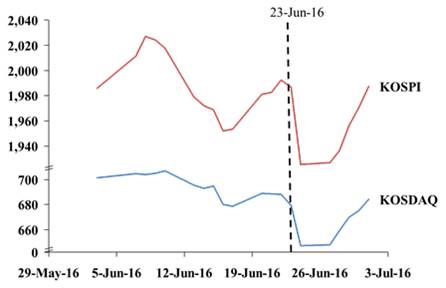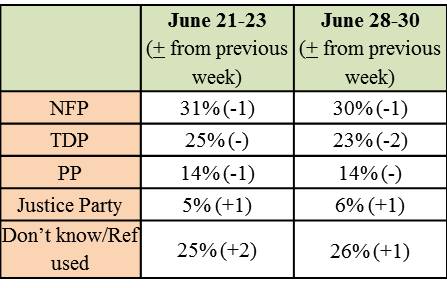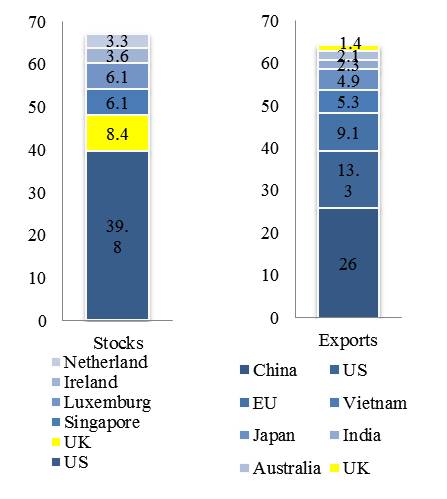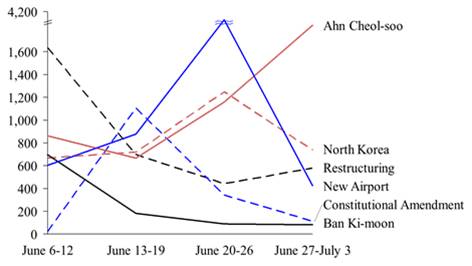Musudan and THAAD
June 22 marked the 5th and 6th time that North Korea test fired its intermediate range missile (i.e. Musudan). While the 5th missile exploded mid-flight, the 6th missile traveled over 400 km before falling into the East Sea.1 The 6th missile rose to an altitude of around 1,000 km, which suggests significant improvements in boost performance.2
The Blue House convened a National Security Council (NSC) session3 and condemned these tests, calling them a “clear violation of UN sanctions and a grave threat to the peace and safety of the Korean Peninsula and the international community.” It also warned that “North Korea will be faced with stronger sanctions and pressure from the South Korean government and the international community.”4
As tensions mount, the South Korean Defense Minister Han Min-goo also added that the issue of THAAD deployment will be determined by the end of this year.5 This was the minister’s first public statement on the matter. Meanwhile, opposition leaders including Park Jie-won urged for increased engagement with the North, stating that “the way to halt North Korea’s development of nuclear weapons and missile is dialogue, cooperation, and a summit meeting [between leaders of the two Koreas].”6
The Economy
In a recent announcement about the state of the Korean economy, the government lowered the official growth forecast from 3.1% to 2.8%.7 The figure is closer to the IMF and the Bank of Korea estimates released earlier this year. To address the challenges associated with a global economic slowdown, the government also announced plans to introduce a stimulus package worth approximately KRW 20 trillion, including a supplementary budget of over KRW 10 trillion.8
The Park administration has used supplementary budget three times over the past four years. Critics point out that the short-term measures signal the government’s failure to strengthen the economy.9 Some observers question whether the stimulus is too small to have much impact.10 Others also state that the Korean economy is in need of fundamental reforms to address the structural problems associated with low birth rates, aging population, and productive inefficiencies. They argue short-term measures only deal with superficial problems.11
Brexit Impact
The initial impact of the Brexit referendum on June 23 was negative as the KOSPI index fell by 3.4% during June 22-24. KOSDAQ benchmark also dropped by 5.9% over the same period.
KOSPI and KOSDAQ, 2016.06.03 ~ 07.01 (in KRW)
The authorities from the Ministry of Strategy and Finance (MOSF) were optimistic that South Korea has enough capacity to deal with a shock to the financial market. However, uncertainties may arise during the negotiations process on the UK’s exit from the EU, triggering subsequent fall outs (e.g. Grexit or Frexit). This may have global impact that South Korea may not easily manage. For now, the government is poised to prevent volatility in the financial market from spilling into the real economy.
Restructuring and Employment
Restructuring of the shipbuilding sector is expected to have a significant impact on employment as eleven major shipbuilding enterprises and their cooperating companies plan to reduce the workforce by 56~63 thousand by the end of 2017.12 According to the Ministry of Employment and Labor, the layoff figures can be readjusted by 20-30 percent.13
To cushion the blow, the government has instituted a special designation status (i.e. Special Employment Assistance) as of July 1 through which the impacted firm would receive tax breaks and special subsidies amounting to KRW 60 thousand per worker each day (max). Laid off workers without employment insurance will receive special unemployment benefits and gain priority for employment in regional Social Overhead Capital projects. Government estimates suggest that approximately 7,800 firms will benefit from this measure. Unfortunately, the three largest shipbuilding firms, whose labor unions voted to strike in opposition to the layoffs, have been excluded from the special designation status for the time being.
Constitutional Amendment
On June 13, the newly-elected Speaker of the National Assembly, Chung Sye-Kyun, urged the floor to consider revising the Korean constitution.14 According to Yonhap, a majority of the assembly would support (250 members, 83.3%) a revision.15 However, there are visible disagreements over the nature and timing of the revision that the Assembly would support. 46.8% (117 members) of those supporting the revision, for instance, agreed that a two-term four-year presidency would be ideal. Another 24.4% supports a semi-presidential system and 14% supports a parliamentary system. Regarding the timing of the revision 47.6% agreed that the revision must be in effect before the next year’s election while 41.2% argued that the next administration must undertake the revision.
Support for Constitutional Revision Among the Three Major Parties
Are you interested in constitutional revision?16
Do you prefer a 5-year single-term presidency or a 4-year two-term presidency?17
President Park Geun-hye has yet to make a statement regarding the revision although she once described it as a ‘black hole’ in 2014.18
People’s Party and Emergency Committees
The two co-leaders of the People’s Party (PP), Ahn Cheol-soo and Chun Jung-bae, resigned from their leadership posts on June 29 amid an illegal rebate scandal involving three members of their own party. Mr. Ahn, however, faced prolonged criticism as most media outlets lamented his slow and indecisive response to the corruption scandal.
The three largest parties currently operate without a leader as the New Frontier Party (NFP) and the Together Democratic Party (TDP) have yet to agree on their own leadership. In the meantime, each party has formed an interim emergency committee to coordinate party activities.
The NFP and TDP are expected to elect new leaders in August 2016, and the PP by February 2017. Until a roster of official leaders can be named, regular meetings with the president and progress over major issues like revising the constitution are expected to be limited.19
Party Approval Rating
The ‘New’ International Airport
The site of South Korea’s second major international airport has drawn much media attention in June. Two locations, Gadeok Island in Busan and Miryang in Gyeongsangnam-do Province, had been the likeliest destination for a new airport until the Land, Infrastructure and Transport Ministry announced on June 21 that it will expand the existing Gimhae Airport instead. The decision was based on a feasibility study carried out by ADPi, a French company specializing in airport engineering. The study compared the different sites’ aviation safety, cost, accessibility, and environment. Gimhae was the most logical choice.
Estimated Costs of ‘New’ Airport20
Critics, however, accused the Park administration of using the new airport to score political gains ahead of the upcoming presidential election in 2017. Reaction from the opposition was divided. Mr. Kim Chong-in, interim leader of the TDP, assessed the decision as a “rather neutral” one.21 But he also worried that the issue may resurface later next year.22 Ahn Cheol-soo, former leader of the PP, accused President Park of creating regional tension. Lamenting the lack of transparency in the decision-making process, Mr. Ahn demanded a formal explanation from President Park. PP member Park Jie-won accused the government for being “incompetent.”23 On the contrary, Ms. Shim Sang-jung, leader of the Justice Party, hailed the government for making “a very difficult but correct decision.” She added that “it was the most responsible action taken by President Park since taking office.”24
President Park stated that upgrading the Gimhae Airport into a ‘new’ airport was the best policy choice.25 Residents near Gimhae Airport welcomed the government’s decision since the expansion project would inject new capital and jobs to the local economy.26
Stocks Owned by Foreign Nationals and Korean Exports in 2015 (in %)
Frequency of Media Coverage (# of Articles)
Contributing Staff(in alphabetical order): Han Minjeong, John J. Lee
Editorial Staff:Jo Eun A, J. James Kim
-
1.
“북한 무수단 미사일 400km 날았다,” 중앙일보, 2016년 6월 22일.
-
2.
“무수단, 고도 1000km 도달… 일부러 위로 쐈을 가능성,” 조선일보, 2016년 6월 23일.
-
3.
“청와대, 北 미사일 도발 관련 NSC 상임위 개최,” 중앙일보, 2016년 6월 22일.
-
4.
“정부, 북 미사일 발사에 ‘더욱 강력한 제재와 압박에 직면할 것’ 경고.” 경향신문, 2016년 6월 22일.
-
5.
“한민구 국방장관 ‘사드 한반도 배치, 올해 안에 결론 날 것’,” 중앙일보, 2016년 6월 29일.
-
6.
“박지원 ‘북한 미사일 중지시키는 길은 남북 정상회담’,” 동아일보, 2016년 6월 23일.
-
7.
“2016년 하반기 경제정책방향,” 관계부처 합동, 2016년 6월 28일.
-
8.
Ibid.
-
9.
“[하반기 경제정책 방향] 20조 더 풀어도 ‘2.8% 성장’,” 경향비즈, 2016년 6월 29일.
-
10.
“[사설] 철학 없는 재탕·짜집기 조치로 경제 살릴 수 있나,” 중앙일보, 2016년 6월 29일.
-
11.
“[기자의 시각] ‘하경정’ 그만하라,” 조선일보, 2016년 7월 1일.
-
12.
“조선업 구조조정 대응 고용지원 및 지역경제 대책, 고용노동부, 2016년 6월 30일.
-
13.
Ibid.
-
14.
“정 의장 ‘朴 대통령, 개헌에 대한 입장 밝히는 게 순리, 정상’,” 조선일보, 2016년 6월 26일.
-
15.
“의원 대다수 찬성한 개헌, 국민 공감대가 중요하다,” 연합뉴스, 2016년 19일.
-
16.
Date: June 21-23; sample size: 1,002; margin of error: +3.1 at the 95% confidence level.
-
17.
Date: June 21-23; sample size: 1,002; margin of error: +3.1 at the 95% confidence level.
-
18.
“野의 특검·대타협委 요구에 부정적… 정치 냉기류 계속될듯,” 조선일보, 2014년 1월 7일.
-
19.
“사상 초유의 ‘3당 비대위 체제’로 책임 정치에 대한 우려 커져,” 한국일보, 2016년 6월 30일.
-
20.
“경제성 따졌다, 결론은 김해공항 확장,” 중앙일보, 2016년 6월 22일.
-
21.
“야당 ‘신공항 백지화는 중립적 판단이지만 아무도 만족 못시킨 정부 무능’,” 경향신문, 2016년 6월 21일.
-
22.
“김종인 ‘신공항 문제는 지역 표 의식한 선거공약 결과’,” 경향신문, 2016년 6월 22일.
-
23.
“야당 ‘신공항 백지화는 중립적 판단이지만 아무도 만족 못시킨 정부 무능’,” 경향신문, 2016년 6월 21일.
-
24.
“신공항 백지화에 심상정 ‘박근혜 정부서 이뤄진 가장 책임있는 결정,” 조선일보, 2016년 6월 21일.
-
25.
“김해공항을 신공항급 확장, 최선의 방안,” 중앙일보, 2016년 6월 23일.
-
26.
“김해공항 인근 주민 ‘사람들 몰려 경제 살아날 듯’,” 중앙일보, 2016년 6월 22일.

 Facebook
Facebook Twitter
Twitter






